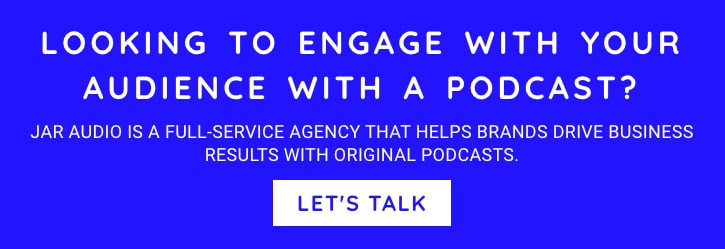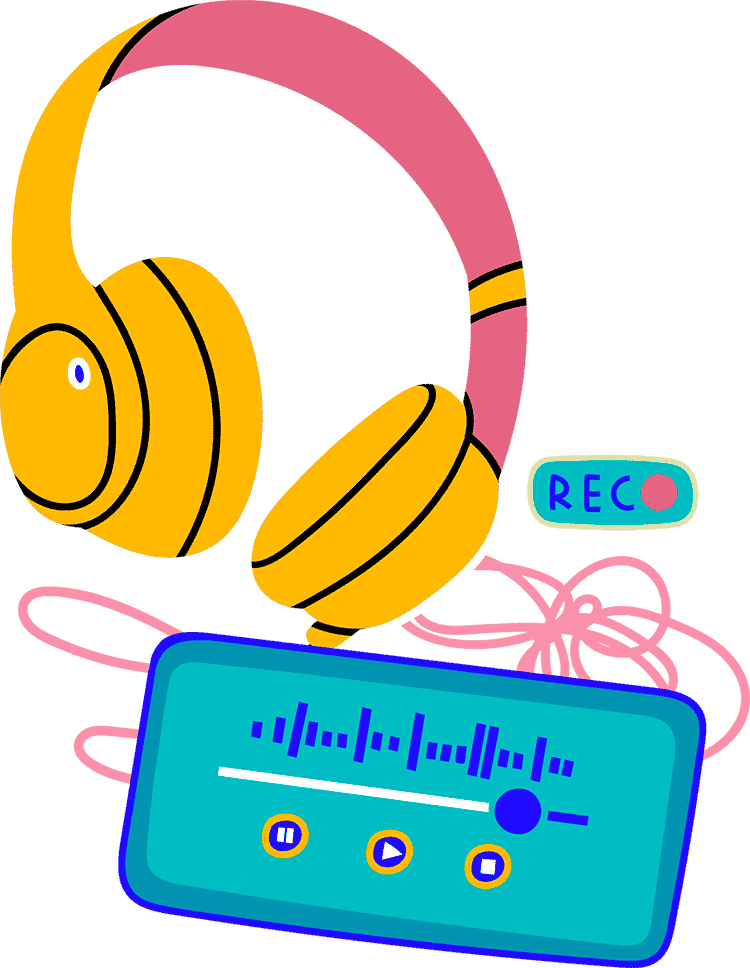The time is right now for branded podcasts.
That’s not to say that it wasn’t time a few years ago and that it won’t still be in five years from now. But the potential impact for branded podcasts is at an all-time high.
Enough businesses have had success with podcasts that we can proudly proclaim that an audio show from a brand is far more than just an idea worth exploring – it’s a requirement for a healthy content ecosystem. The potential for customer connection is enticing.
But with all great opportunities comes great opposition.
So we’ve broken this out into two pieces.
-
The most common podcast business questions that we encounter, paired with data, insight, and common sense responses.
-
The Podcast Business Case template, a one-pager we’ve designed with potential podcast evangelists in mind.
Frequently Asked Podcast Business Questions
What ROI can we expect from a podcast?
It’s ok to ask about ROI, and we’re happy to talk about it because there are tons.
It all depends if you’re looking to build your brand, drive leads and sales, or generate internal brand equity recruitment. Check out our recent article on how to measure podcast ROI.
Is the podcast market too saturated?
Music streaming dates as far back as 1998. Did that stop Spotify from launching 2006 and rising above the streaming noise?
Or a stronger analogy: There are literally thousands of new shows made for streaming platforms every year. Does those stop companies like Netflix from making new ones?
Just because the market is hot doesn’t mean you can’t succeed. If anything, the current surge of branded podcasts is pushing the content to new heights and coinciding with an explosion of audio-medium consumption. As more devices and platforms optimize audio, so does the public’s attention and need for content on those mediums.
As per recent Edison Research, 2019 saw a record high for time spent listening to online audio, with an average of 17-hours of listening per week, and this growth is only expected to continue.
Do we already have too many content platforms?
Good question, and we’ll ask you this one: in 2020, can we really still say that we’re getting tons of ROI from social media and that our website advertising is working?
Don’t hesitate to shake things up.
The modern content strategy offers us the power to actively learn from our audience – so why not dive into what’s hot? Why not invest in new mediums?
A podcast is not only a powerful marketing tool, but there’s currently a growth in the podcast medium that itself is tied to the audio boom.
According to this recent report from Deloitte, “We also predict that the global podcasting market will increase by 30 percent to reach US$1.1 billion in 2020, surpassing the US$1 billion mark for the first time… audiobooks and podcasts are outgrowing their “niche” status to emerge as substantive markets in their own right.”
What if we don’t have the time or resources to commit to a podcast?
It only takes six days. That’s it. No, really!
And as much as we’d like to take some credit there for keeping the process smooth, it’s a simple reality that once the podcast is set up and ready to go, it functions like clockwork!
Those six days will be spread out over the course of 3-4 months, which is far less than other forms of content such as video, where you can easily spend six days on set alone. Or even social media, which literally requires an entire department.
How can we launch a good podcast without any experience?
Do you like consuming good content? If the answer is yes, then you’ve got the experience to collaborate on a successful podcast with the right production partner.
Ideally, your podcast production partner would work with you on the following elements:
Creative: Develop your brand’s “sound” and topics for the show.
Production: Lead all production including recording, writing, mixing, editing and music composition.
Guest Logistics: Finding, prepping, and booking interviews with guests according to the agreed-upon production schedule.
Research & Writing: Topic area research, interview question lines, individual episode script development, narration script, sound effects and creative scene treatment.
Casting: Sourcing voice talent most suitable to the project goals.
Audience Growth: Crafting the distribution strategy and executing on that strategy to promote your podcast. It’s not a podcast without an audience!
To understand what it’s really like to launch a branded podcast, check out this case study about Saje Wellness.
What if nobody listens to our podcast?
This fear is valid. There’s nothing worse than a Facebook post with no Likes, an email with no Clicks, a YouTube video with no Views. Or a Podcast with no Downloads. These are nightmare scenarios for content creators.
But it’s time to face our fears because FOMO is worse than failure.
Although a dud wouldn’t look good, a competitor with a #1 podcast that discusses a topic your brand could have owned will look much, much worse. Plus, there’s never any harm in trying a new medium with which to connect to your audience and at the very least, you’ll learn if podcasts are right for you.
So scratch that itch.
Plus, we have some numbers that may ease your fears:
-
According to our Podcast ROI Formula, a brand can expect to convert 10% of its social followers into listeners from the very beginning
-
Our branded podcasts receive consumption rates as high as 95%!
-
According to Deloitte, “Of the 21 percent of adult Americans who listen to podcasts, most are doing so regularly. Thirty-eight percent of surveyed podcast listeners reported listening daily or almost daily, 66 percent at least once a week, and 87 percent at least monthly.” People are listening to podcasts. Don’t you worry about that.
Make a Business Case for your Branded Podcast
Let’s dive into the elements of what that Business Case will look like. We’ve created a handy one-pager template that has all the necessary elements for you to fully bulletproof the podcast case.
This one-pager can be used in a variety of scenarios, such as convincing your team or deciding how and when to allocate budget to a podcast. It’s like a mini cheat sheet to help you justify the potential for a branded podcast.
This template contains:
-
Executive Summary
-
Business Objective
-
Target Users
-
Supporting Materials
-
Next Steps
By now, you have all the tools needed to make the case for the brand podcast and beat back the opposition from within. Go find your sound!


